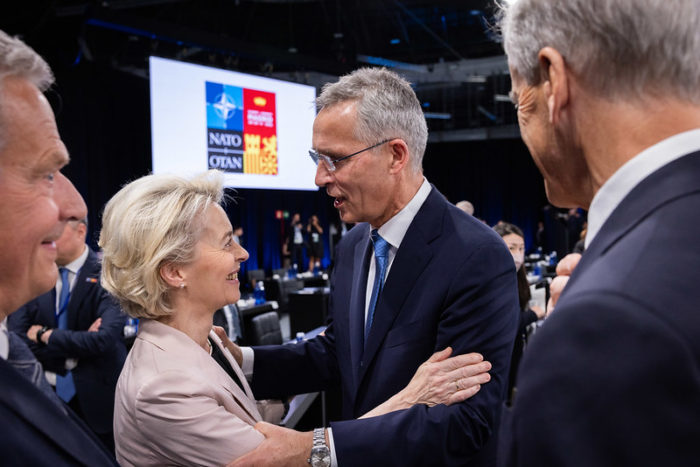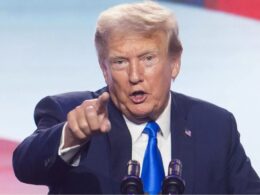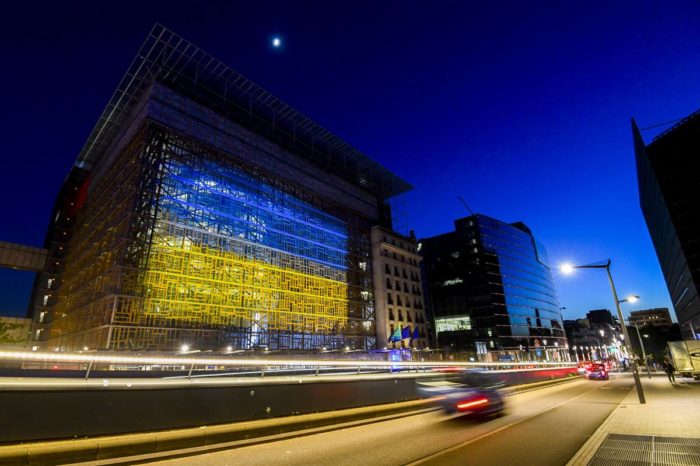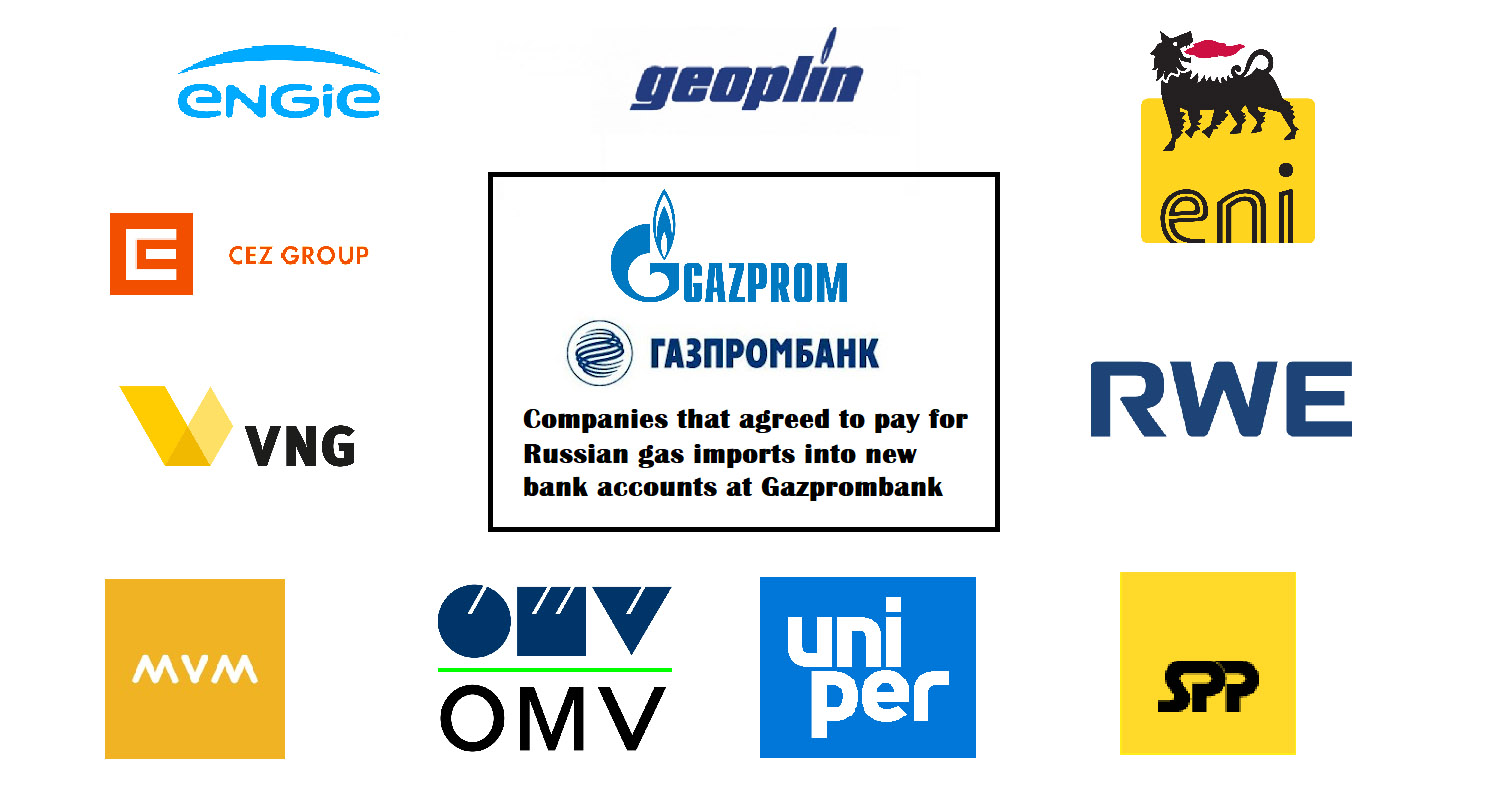1 July 2022 has ushered in a sea change of renewed western solidarity for international alliances. In Brussels, the rotating head of the European Union transitioned from Paris to Prague, as the Czech Republic took the presidential reigns from France. The first priority listed in Prague’s program addresses Ukraine:
“[T]he Czech Presidency will support the EU’s efforts to defend Ukraine’s sovereignty and territorial integrity by using all instruments and programmes offered by the EU, including the strengthening of sanctions. The EU’s and its Member States’ political and military support for Ukraine is in our vital interest in order to ensure security in Europe.”
During the previous fortnight, a series of watershed moments strengthened the resolve of international alliances redefining themselves against the altered geopolitical landscape of war in Ukraine. As the conflict has continued since February, not all of Kyiv’s allies have moved together at the same pace, or even indeed in the same direction, and the discrepancies have been marked.
Germany has lagged and hesitated with its weapons deliveries, with Chancellor Olaf Scholz receiving heavy criticism domestically. Italy has seen its populist Five Star Movement split over the war, with Foreign Minister Luigi Di Maio’s support of Prime Minister Mario Draghi’s pro-Ukrainian stance clashing with the party leader’s less favorable view. French President Emmanuel Macron alarmed allies by saying that the West “must not humiliate Russia,” while Spain’s Prime Minister Pedro Sánchez has encountered fierce backlash from his left-wing coalition partner for supplying offensive military weaponry to Kyiv.
Yet the final days of June heralded a newly reframed and unified constellation. The 24th marked exactly four months since Russian forces rolled into Ukrainian territory, and three summits clustered around this period – hosted by the EU, the G7, and NATO – reflected a recognition of new global realities, with the war in Ukraine dominating the agenda of all three conferences.
The message presented to the world by this trifecta of meetings underscored the strength of the organizations through alteration as opposed to static unity. Embracing change and transformation, the alliances have redefined the scope of their missions in order to fully meet the security demands of the twenty-first century.
EUROPEAN UNION SUMMIT 23-24 June 2022
(Brussels, Belgium)
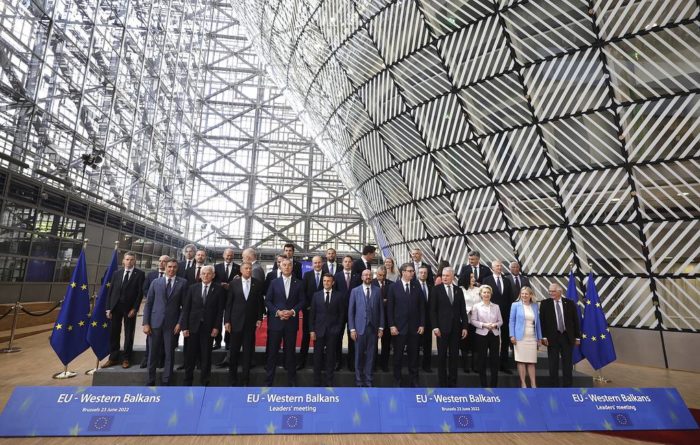
The European Union Summit in Brussels was foreshadowed by a visit to Kyiv on 16 June by Chancellor Scholz, President Macron, Prime Minister Draghi, and Romanian President Klaus Iohannis. The presence of these leaders sent an unmistakable message to Kyiv, as well as to the Kremlin, and it was announced that all four supported the immediate granting of EU candidate status to Ukraine. The churlish response from former Russian President Dimitri Medvedev revealed Moscow’s pique: “European fans of frogs, liverwurst, and spaghetti love visiting Kyiv.”
The following day, European Commission President Ursula von der Leyen conveyed the Commission’s opinion that it, too, recommended Ukraine be granted candidacy status. “Ukrainians are ready to die for the European perspective,” she later said. “We want them to live with us the European dream.”
A week later, on the first day of the Brussels summit, the European Council announced that they were granting both Ukraine and Moldova candidate status, a move that would allow the countries to begin the involved process of becoming full EU members. It was a step that the leaders of several member states had refused to consider back in March when the European Council gathered in Versailles for an emergency meeting following the Russian invasion. Yet, according to reporting from Bloomberg, it was specifically the unrelenting, behind-the-scenes hardball tactics of von der Leyen that led to the bloc finally agreeing to open its ranks.
A watershed moment
President Volodymyr Zelenskyy hailed the moment as a victory for which the country had been waiting thirty years.
For many, the symbolism of the announcement against the backdrop of Russia’s brutality could not be overstated. Lithuania’s President Gitanas Nauseda referred to candidate status as “the least [the EU] can provide” to Ukraine as it continues its “heroic fight for freedom.” President Macron echoed that sentiment, insisting, “We owe it to the Ukrainian people who are fighting to defend our values, their sovereignty, their territorial integrity.”
The announcement by the Council merely signals the first stage of a long process as it opens accession talks with Kyiv and Chișinău. Priorities will be set, and reforms regarding issues of rule of law and corruption for both countries will be introduced. Both nations will also need to fully comply with all the regulations necessary in order to institute fully established market economies. According to European officials, Ukraine has already implemented approximately 70% of the necessary standards and rules, though the remaining hard work, they stress, will take years.
Ukraine is now an EU candidate. What happens now? When will it become a member?
Hailing the step as historic, Latvian Prime Minister Krisjanis Karins believes that candidacy status will galvanize the countries into instigating these required changes. “Remembering Latvia’s experience on the way to the EU,” he explained, “today’s decision will play an important role in implementing the necessary reforms in both new candidate countries.”
Alternately, both Germany and Belgium focused on the responsibilities which Brussels has in fulfilling its end of the arrangement, with Chancellor Scholz admitting that the EU must “make [itself] capable of enlargement.” Belgian Prime Minister Alexander De Croo emphasized that Brussels must act reciprocally if Kyiv puts in the effort to meet the requirements. It is an awareness highlighting a conscientious maturity that has not always been a hallmark of Brussels bureaucracy.
GROUP OF 7 SUMMIT 26-28 June 2022
(Schloss Elmau, Krün, Germany)
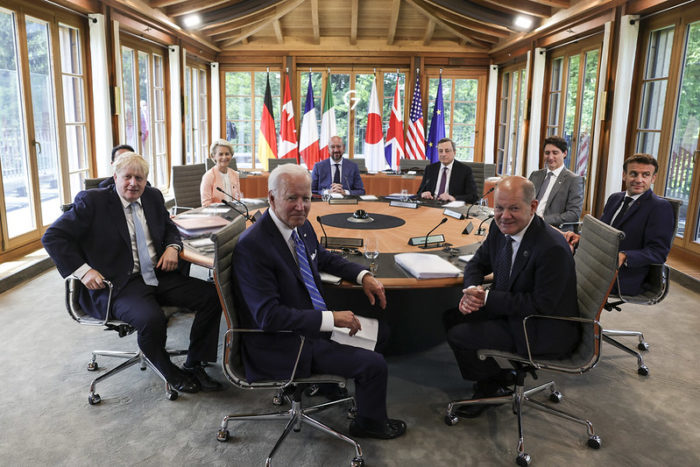
As with the EU summit, the war in Ukraine provided the focal point of the G7 meeting, with President Zelenskyy addressing the leaders via video link. Releasing a six-page “Statement on Support for Ukraine,” the leaders of the forum reaffirmed their solidarity with the war-torn nation and also specifically supported its membership candidacy in the EU:
“We welcome the European Council’s decision to grant the status of candidate country to Ukraine and Moldova. We will continue to provide financial, humanitarian, military and diplomatic support and stand with Ukraine for as long as it takes. As we do so, we commit to demonstrate global responsibility and solidarity through working to address the international impacts of Russia’s aggression, especially on the most vulnerable.”
In an attempt to mitigate the fallout of Russia’s war on Ukraine and the devastation it is wreaking on global food prices, the group pledged to raise $600 billion in aid for developing countries in a new Partnership for Global Infrastructure and Investment. The move was a chance for the group to maneuver not just against global ramifications from Moscow but also unify against Beijing’s growing influence abroad. Though China was never referred to by name, President Joe Biden stressed that the project would allow countries to “see for themselves the concrete benefits of partnering with democracies.” Focusing on this new realignment and enlargement strategy, India, Argentina, South Africa, Indonesia, and Senegal were invited to participate as partner nations at the summit.
Continuing the focus on Ukraine, the group announced that it would be expanding sanctions against Moscow by instituting a ban on imports of Russian gold. Russia’s gold holdings have tripled since 2014’s annexation of Crimea, and according to US reports, the metal represents the second-largest export for the country at $15.5 billion, with 90% of that trade consigned to G7 nations. It is thus a critical asset for Russia’s central bank as the Kremlin attempts to navigate the sanctions placed on its assets following its most recent invasion of Ukraine.
NORTH ATLANTIC TREATY ORGANIZATION SUMMIT 28-30 June 2022
(Madrid, Spain)
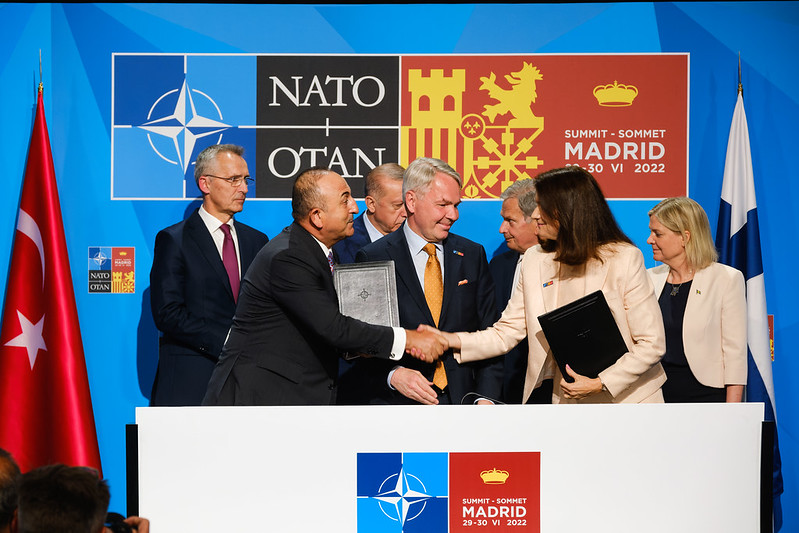
First row: Mevlüt Çavuşoğlu Minister of Foreign Affairs of Türkiye, Pekka Haavisto Minister of Foreign Affairs of Finland, and Ann Linde of Minister of Foreign Affairs of Sweden
Second row: NATO Secretary General Jens Stoltenberg, President Recep Tayyip Erdoğan of Türkiye, President Sauli Niinistö of Finland and Prime Minister Magdalena Andersson of Sweden. Credit: NATO/Flickr
NATO Secretary-General Jens Stoltenberg declared that Madrid would be “a pivotal summit.” Speaking before the meeting, he explained how members would “agree on a new strategic concept, the Madrid strategic concept, that will the blueprint for NATO in a more dangerous and unpredictable world.” In a historic first, the summit also included NATO’s Asia-Pacific partners at the leaders’ level in a nod to the increased awareness of China’s expanding role in Indo-Pacific affairs.
Though the Madrid summit was planned before Russia invaded Ukraine, the repercussions from the war dominated the agenda, and it has returned the defensive alliance more definitively to the bedrock of its founding: countering Russian aggression. In NATO’s 2010 Strategic Concept, Russia was listed as a “potential strategic partner”; in 2022, the country is christened “the most significant and direct threat to Allies’ security and to peace and stability in the Euro-Atlantic area.” President Zelenskyy again addressed the summit via video-link, and the alliance released an updated Comprehensive Assistance Package for Ukraine which includes medical supplies and fuel, as well as communications and anti-drone equipment.
New Members
One of the main focal points of the summit in Madrid was the formal recognition of the candidacy bids of new member states Sweden and Finland. Both countries have histories of neutrality, yet following the Russian invasion of Ukraine, the populations of both countries have vocally supported a change of policy. In the instance of Sweden, it has taken only one hundred days to undo two hundred years of internationally-recognized military non-alignment, a historical pivot referenced by Swedish Prime Minister Magdalena Andersson when she announced the country’s application to the alliance.
General Secretary Stoltenberg referred to the step as “historic” and announced that the remaining Scandinavian countries joining the alliance will “make them safer, NATO stronger, and the Euro-Atlantic area more secure.” Summit host President Sánchez called the entry of the nations into NATO “a milestone” that will strengthen the alliance.
The ratification process for new members normally takes a year, but many parliaments have stated they will attempt to expedite the process. The two governments formally applied to join in May, but the process has been hampered by Turkish President Recep Edoğan’s threat to veto the move. In mid-June, he refused to engage in bilateral talks with the two Nordic nations, instead accusing them of being “incubators” for terrorist organizations (specifically, the militia group PKK, the Kurdistan Workers’ Party, as well as alleged members of the so-called Gülenist movement, presumed by Erdoğan to be behind the attempted 2016 coup d’état in Türkiye that nearly removed him from office).
This is not the first time Ankara has held up NATO business with its veto power. In 2017, Erdoğan vetoed the alliance’s cooperation with Austria, a vote which stalled partnership pursuits with over forty other nations. In response, NATO members voted to change the alliance’s procedures, a move which permitted partnerships to be permitted on an individual-vote basis.
A Trilateral Agreement
In Madrid, other arrangements were made. Directly before the summit, Erdoğan dropped his objection to the membership bids and signed a trilateral agreement which required Sweden and Finland to “commit to tackle threats to the national security of Türkiye and to crack down on PKK terrorists with an agreement on extradition.” The agreement prevents recruitment and fundraising activities by the PKK, and Türkiye has demanded the extradition of more than 30 individuals by Finnish and Swedish authorities. Though Ankara reported it had “got what it wanted,” Secretary General Stoltenberg was quick to point out that while Helsinki and Stockholm are “ready to work with Türkiye on the pending deportations or extradition requests of terror suspected individuals… this extradition process will take place in accordance with the European Convention on Extradition.”
The agreement also pledges “not to impose embargo restrictions in the field of defense industry” on Türkiye. In 2019, Stockholm revoked all of its export licenses for weapons and munitions to Türkiye, following Erdoğan’s military campaign in north Syria. At the time, the Swedish Minister for Foreign Affairs stated that “Türkiye’s actions are irresponsible and contravene international law.” At the end of May, the Swedish daily Expressen reported that government officials had signaled that they would be reversing their stance on sales of armaments to Ankara.
How these developments will play out with voters in Sweden and Finland remains to be seen. A survey for Finland’s Helsingin Sanomat newspaper reported that 70% of those polled do not approve of any change in legislation or principles to what they consider the appeasement of Türkiye.
It was also reported that the US has approved the sale of new F-16 fighter jets to Ankara, with Erdoğan reportedly removing his objections to the new members after speaking to President Joe Biden. US officials have informed reporters that Türkiye was not offered anything in order to facilitate the trilateral agreement. President Biden did not respond to questioning on the subject.
Eastern Defenses and Rapid Defense Forces
In response to Russia’s brutal invasion of Ukraine, and increased anxiety from eastern NATO members, the alliance announced an increase of its forces placed on readiness high alert from 40,000 to 300,000. A large number of these forces will be focused on NATO’s eastern flank as it shores up the organization’s presence in the Baltic states of Latvia, Lithuania, and Estonia. Both Britain and Germany have already committed to upscaling their Estonian and Lithuanian forces, respectively, to brigade strength (3,000+ troops).
Baltic Sea as a “NATO lake” and limits to Erdogan romance: NATO Summit delivers blows to Russia
Calling Madrid a “history-making summit,” President Biden reaffirmed the US’s commitment to the alliance, with the US Department of Defense announcing the establishment of a permanent base in Poland comprised of V Corps headquarters and a field support battalion. More US military would also be committed in rotational deployments to the Baltic region, with American troops now totaling more than 100,000 service members on the European continent. Washington will also deploy two additional F-35 squadrons to the U.K., as well as station two additional naval destroyers in Spain.
Another significant realignment will be the pre-allocation and pre-assignment of troops. This allows military units to be trained at home while being pre-designated to specific countries, facilitating a more efficient streamlining of operational forces.
General Secretary Stoltenberg confirmed that this strategic military restructuring “constitutes the biggest overhaul of [NATO’s] collective defense and deterrence since the Cold War.”
1 July 2022
The first of July dawned in Europe with a newly-drawn geopolitical map, but also with a renewed focus on the continent’s commitment to rethinking and strengthening its alliances.
In the morning, Commission President von der Leyen addressed a special session of the Ukrainian parliament via video link. She relayed that Ukraine’s path to becoming an EU member state was within the nation’s power, and she assured Kyiv of the Union’s commitment to its candidacy:
“Your European path and the reconstruction of the country will go hand in hand. There is a long road ahead but Europe will be at your side every step of the way, for as long as it takes, from these dark days of war until the moment you cross the door that leads into our European Union.”
The commitment to dynamic transformation underscores the newly-envisioned futures and redefined identities of what were, not six months ago, three institutions still firmly rooted in the accepted frameworks of their post-Cold War ideologies. How they navigate this new terrain will shape the developments of the still-undecided twenty-first-century world order.
Related:
- Baltic Sea as a “NATO lake” and limits to Erdogan romance: NATO Summit delivers blows to Russia
- NATO’s Strategic Concept-2022: names Russia as threat, deletes key commitment to act on this threat
- Global community must drop romanticized image of Russia – Ukrainian Dialogue
- What NATO should do
- Ukraine is now an EU candidate. What happens now? When will it become a member?




